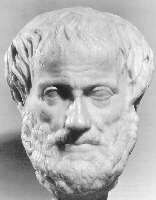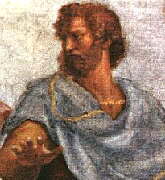skip to main |
skip to sidebar

5:45 AM

OGB community

- Born at Stagira in northern Greece, Aristotle was the most notable product of the educational program devised by Plato; he spent twenty years of his life studying at the Academy. When Plato died, Aristotle returned to his native Macedonia, where he is supposed to have participated in the education of Philip's son, Alexander (the Great). He came back to Athens with Alexander's approval in 335 and established his own school at the Lyceum, spending most of the rest of his life engaged there in research, teaching, and writing. His students acquired the name "peripatetics" from the master's habit of strolling about as he taught. Although the surviving works of Aristotle probably represent only a fragment of the whole, they include his investigations of an amazing range of subjects, from logic, philosophy, and ethics to physics, biology, psychology, politics, and rhetoric. Aristotle appears to have thought through his views as he wrote, returning to significant issues at different stages of his own development. The result is less a consistent system of thought than a complex record of Aristotle's thinking about many significant issues.
The aim of Aristotle's logical treatises (known collectively as the Organon) was to develop a universal method of reasoning by means of which it would be possible to learn everything there is to know about reality. Thus, the Categories proposes a scheme for the description of particular things in terms of their properties, states, and activities. On Interpretation, Prior Analytics, and Posterior Analytics examine the nature of deductive inference, outlining the system of syllogistic reasoning from true propositions that later came to be known as categorical logic. Though not strictly one of the logical works, the Physics contributes to the universal method by distinguishing among the four causes which may be used to explain everything, with special concern for why things are the way they are and the apparent role of chance in the operation of the world. In other treatises, Aristotle applied this method, with its characteristic emphasis on teleological explanation, to astronomical and biological explorations of the natural world
In Metafusikh (Metaphysics) Aristotle tried to justify the entire enterprise by grounding it all in an abstract study of being qua being. Although Aristotle rejected the Platonic theory of forms, he defended his own vision of ultimate reality, including the eternal existence of substance. On The Soul uses the notion of a hylomorphic composite to provide a detailed account of the functions exhibited by living things—vegetable, animal, and human—and explains the use of sensation and reason to achieve genuine knowledge.
 That Aristotle was interested in more than a strictly scientific exploration of human nature is evident from the discussion of literary art (particularly tragedy) in Peri PoihtikhV (Poetics) and the methods of persuasion in the ‘RhtoreiaV (Rhetoric).
Aristotle made several efforts to explain how moral conduct contributes to the good life for human agents, including the Eqikh EudaimonhV (Eudemian Ethics) and the Magna Moralia, but the most complete surviving statement of his views on morality occurs in the Eqikh Nikomacoi (Nicomachean Ethics). There he considered the natural desire to achieve happiness, described the operation of human volition and moral deliberation, developed a theory of each virtue as the mean between vicious extremes, discussed the value of three kinds of friendship, and defended his conception of an ideal life of intellectual pursuit.
But on Aristotle's view, the lives of individual human beings are invariably linked together in a social context. In the Peri PoliV (Politics) he speculated about the origins of the state, described and assessed the relative merits of various types of government, and listed the obligations of the individual citizen. He may also have been the author of a model PoliteiaV Aqhnawn (Constitution of Athens), in which the abstract notion of constitutional government is applied to the concrete life of a particular society.
That Aristotle was interested in more than a strictly scientific exploration of human nature is evident from the discussion of literary art (particularly tragedy) in Peri PoihtikhV (Poetics) and the methods of persuasion in the ‘RhtoreiaV (Rhetoric).
Aristotle made several efforts to explain how moral conduct contributes to the good life for human agents, including the Eqikh EudaimonhV (Eudemian Ethics) and the Magna Moralia, but the most complete surviving statement of his views on morality occurs in the Eqikh Nikomacoi (Nicomachean Ethics). There he considered the natural desire to achieve happiness, described the operation of human volition and moral deliberation, developed a theory of each virtue as the mean between vicious extremes, discussed the value of three kinds of friendship, and defended his conception of an ideal life of intellectual pursuit.
But on Aristotle's view, the lives of individual human beings are invariably linked together in a social context. In the Peri PoliV (Politics) he speculated about the origins of the state, described and assessed the relative merits of various types of government, and listed the obligations of the individual citizen. He may also have been the author of a model PoliteiaV Aqhnawn (Constitution of Athens), in which the abstract notion of constitutional government is applied to the concrete life of a particular society.

 That Aristotle was interested in more than a strictly scientific exploration of human nature is evident from the discussion of literary art (particularly tragedy) in Peri PoihtikhV (Poetics) and the methods of persuasion in the ‘RhtoreiaV (Rhetoric).
Aristotle made several efforts to explain how moral conduct contributes to the good life for human agents, including the Eqikh EudaimonhV (Eudemian Ethics) and the Magna Moralia, but the most complete surviving statement of his views on morality occurs in the Eqikh Nikomacoi (Nicomachean Ethics). There he considered the natural desire to achieve happiness, described the operation of human volition and moral deliberation, developed a theory of each virtue as the mean between vicious extremes, discussed the value of three kinds of friendship, and defended his conception of an ideal life of intellectual pursuit.
But on Aristotle's view, the lives of individual human beings are invariably linked together in a social context. In the Peri PoliV (Politics) he speculated about the origins of the state, described and assessed the relative merits of various types of government, and listed the obligations of the individual citizen. He may also have been the author of a model PoliteiaV Aqhnawn (Constitution of Athens), in which the abstract notion of constitutional government is applied to the concrete life of a particular society.
That Aristotle was interested in more than a strictly scientific exploration of human nature is evident from the discussion of literary art (particularly tragedy) in Peri PoihtikhV (Poetics) and the methods of persuasion in the ‘RhtoreiaV (Rhetoric).
Aristotle made several efforts to explain how moral conduct contributes to the good life for human agents, including the Eqikh EudaimonhV (Eudemian Ethics) and the Magna Moralia, but the most complete surviving statement of his views on morality occurs in the Eqikh Nikomacoi (Nicomachean Ethics). There he considered the natural desire to achieve happiness, described the operation of human volition and moral deliberation, developed a theory of each virtue as the mean between vicious extremes, discussed the value of three kinds of friendship, and defended his conception of an ideal life of intellectual pursuit.
But on Aristotle's view, the lives of individual human beings are invariably linked together in a social context. In the Peri PoliV (Politics) he speculated about the origins of the state, described and assessed the relative merits of various types of government, and listed the obligations of the individual citizen. He may also have been the author of a model PoliteiaV Aqhnawn (Constitution of Athens), in which the abstract notion of constitutional government is applied to the concrete life of a particular society. 

 5:45 AM
5:45 AM
 OGB community
OGB community












0 comments:
Post a Comment